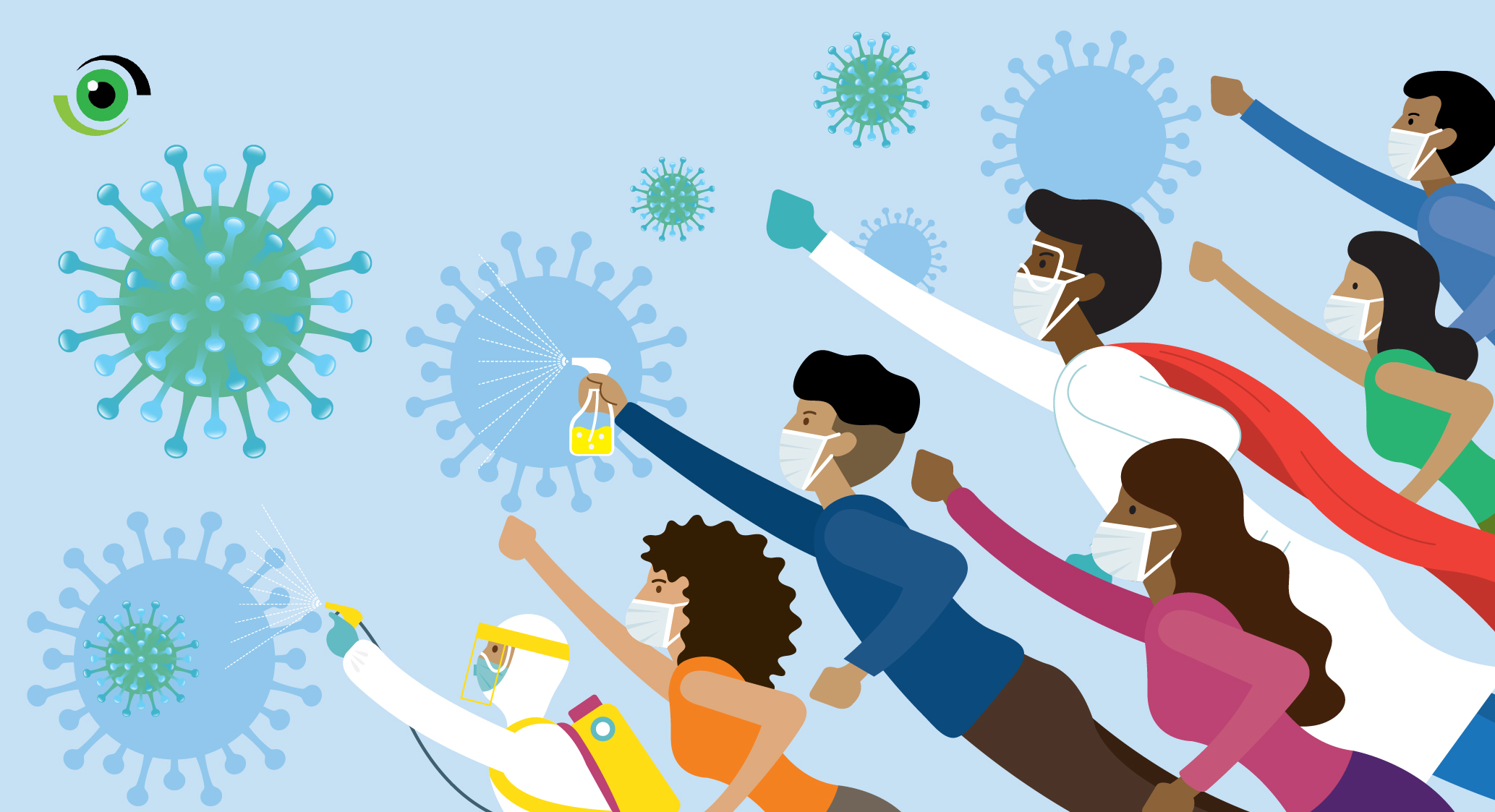The COVID-19 pandemic has revealed that there is no dropping the ball when it comes to preventing, detecting and responding to infectious disease outbreaks. Therefore, during the Nigerian Conference of Applied and Field Epidemiology — NiCAFE2021, which took place on the 27th and 28th July 2021, speakers and panelists shared strategies to strengthen public health using lessons from the response to the pandemic. These insights highlight ways to sustain the progress made in the past year and leverage lessons learned to prepare for, detect and respond to future disease outbreaks faster and more effectively. As the world continues to recover from the impact of the pandemic while still dealing with new variants and waves, it is crucial that we reflect on these insights and find ways to apply the lessons learned so far.
Letting science lead
Infectious diseases don’t have political loyalties. Neither do they have any religious or ethnic leanings. So, when they happen, the best way to mount an effective response is to base decisions on evidence and data. Given the critical role epidemiology plays in the fight against infectious diseases, this means letting scientists and national and regional public health institutes to lead the response. The World Health Organisation’s (WHO) Chief Scientist, Dr Soumya Swaminathan strongly advocated for this during her keynote presentation. She also commended the effective data-led response efforts to the pandemic.
After giving an update on the status of the COVID-19 pandemic, Swaminathan said the first lesson is “About data and numbers.” Because “If you don’t have reliable sources of data, whether it’s birth and death data, whether it’s cause of death data, whether it’s the disease incidence and prevalence data, it’s very difficult to have policies that actually respond to the needs on the ground”.
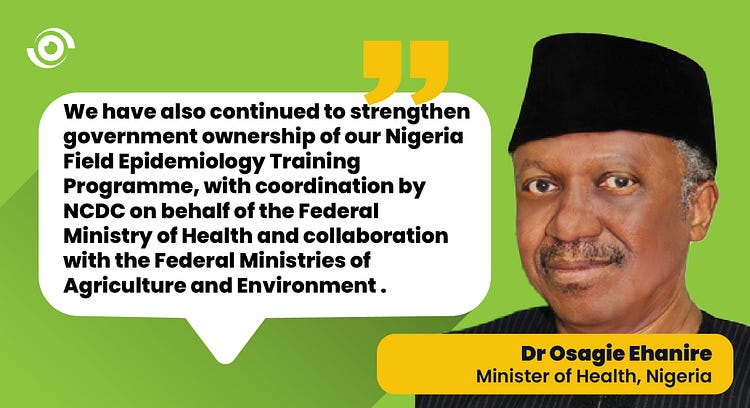
Only when public health responses are backed by science can meaningful outcomes be seen in the response to public health threats. It is such advancements in science that played a significant role in the COVID-19 response, in areas such as accelerating vaccine development, helped by prior research that helped fast track the development of existing technologies being used for the approved vaccines.
Science also makes genomic surveillance possible and such data enables the monitoring of changes in the virus over time. According to Swaminathan, genomic surveillance compliments field epidemiology because in today’s world, both have to go together to better understand how a disease outbreak progresses. Just as the mRNA fast tracked vaccine development for COVID-19, she said “We need to apply the lessons from genomic surveillance of COVID to diseases, like tuberculosis, HIV, malaria, as well as Lassa and Ebola, in order to expand our understanding of these infectious diseases”.
But trusting science is one thing and trusting local content is another. In his plenary presentation, the Director General of the Nigerian Institute of Medical Research (NIMR), Professor Babatunde Salako said Nigerian researchers and government must believe in the ability of Nigerian scientists to innovate. “Their capacity to contribute to research leading to solutions in our public health responses during any disease outbreak must be trusted”.
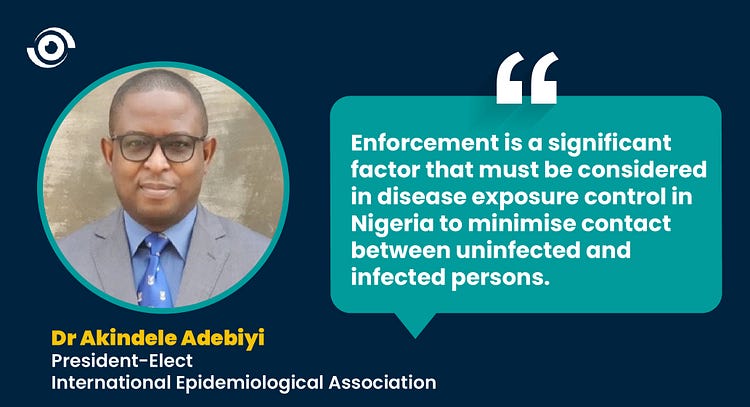
Protecting the protector
Health workers stand between the public and dangerous infectious agents such as the SARS-CoV-2 that causes COVID-19. Through their efforts, these diseases are detected and prevented early when they happen and managed to minimise impact. Yet, most health workers often lack the basic personal protective equipment (PPE) to protect themselves. As of July 2020, over 10, 000 healthcare workers have been infected with COVID-19 in Africa. Nigeria had about 400 health worker infections. Additionally, infection prevention and control (IPC) efforts are not proactive in most hospitals. To forestall the spread of infectious diseases and reduce hospital acquired infections, IPC must be a culture entrenched in health facilities and not a reactive process when there are disease outbreaks.
These were some of the points highlighted by Professor Folasade Ogunsola, the Chair of Infection Control Africa Network (ICAN) during her plenary. She commended the “Turn Nigeria Orange” project launched by the Nigeria Centre for Disease Control (NCDC) in 2019 to mark Hand Hygiene Day as an effort that wasn’t reactive. The project was launched to strengthen the culture of hand hygiene and IPC in healthcare institutions across the country as it is seen as critical for Universal Health Coverage. Multimodal strategies, collaboration between professionals and government, consistency, leadership support and systems strengthening are some of the ways to build proactive IPC practices in health facilities.
However, there are issues with institutionalising the culture of IPC in health facilities. Water, Sanitation, and Hygiene (WASH) is one. It is very challenging to achieve IPC without access to clean water. For instance, a WASH assessment in Primary Health Centres (PHC) in the Federal Capital Territory (FCT) and Niger State conducted by Nigeria Health Watch and EpiAFRIC showed that 25% of the PHCs assessed in the FCT pay for water from their budget; 58% experience interruption in their water source and 83% do not have IPC protocols.
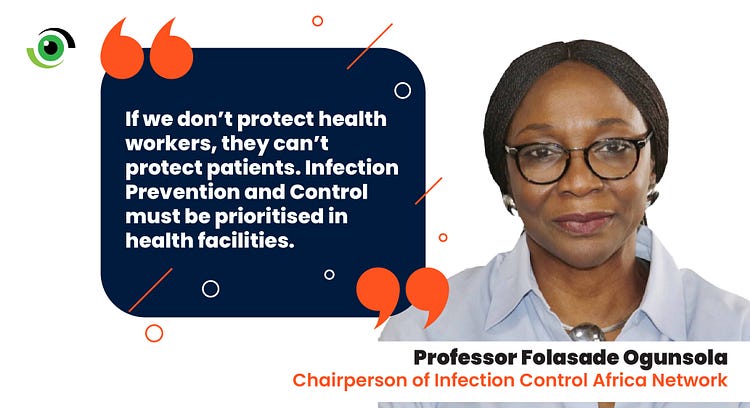
Making PPE sizing gender equitable is another emerging challenge affecting the implementation of IPC measures. Women make up a significant share of the global health workforce but are underrepresented in leadership roles. This means they can’t influence PPE manufacturing standards. Recent research found that respiratory equipment fit poorly for 16.7% of female health workers compared to 7.6% of their male counterparts. When PPE fits poorly, the wearer is exposed to infections, increasing their stress and anxiety at work. Hopefully, a new Gender Equal Health and Care Workforce Initiative launched by France, WHO and Women in Global Health will make a difference.
Stronger public health institutes have advantages
In his presentation, the Director of Africa Centers for Disease Control, Dr John Nkengasong said it is impossible to build health systems in the middle of a pandemic, that the time after an outbreak, referred to as “peacetime”, should be used to prepare for the next outbreak (war response). This is because “You can’t avoid a pandemic, but can minimise it”, he said.
According to Nkengasong, one of the lessons learned from the COVID-19 response was the need for better coordination and collaboration for a “whole of Africa” approach that helps develop “important continent-specific guidelines”. The inability to manufacture diagnostics locally is a health security challenge. Similarly, vaccine-related innovation is important for Africa’s health security.
Moving the needle: The role of the private sector
Nkengasong pointed out that self-preservation is a natural human phenomenon, so, rich countries will always prioritise their citizens even though the pandemic has shown us that no one is safe until everyone is safe. He said this realisation should make African countries invest more in research and development to expand the manufacture of vaccines, diagnostics, and therapeutics on the continent.
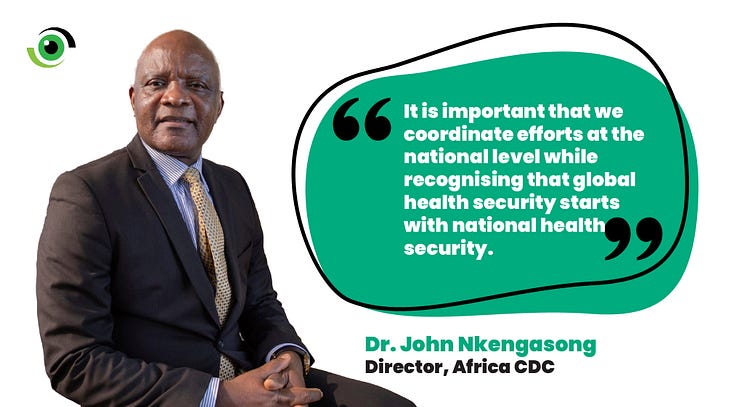
Ms. Zouera Youssoufou, Managing Director, Dangote Foundation, said the private sector can support the government in this regard but first, they need to understand the science. “The private sector plays a critical role in the health security of any country. It is important to strategise and think about translating science to a language the private sector can understand to get them involved,” she said. This can lead to significant investments as shown by Dr. Richard Hatchett who leads the Coalition for Epidemic Preparedness Innovations (CEPI). He said the coalition has established 13 partnerships and deployed USD 1.5 billion to develop COVID-19 vaccines. This is the largest vaccine portfolio globally.
But translating science for better understanding to drive investment from the private sector is one thing, receiving the necessary support from government is another. For private sector efforts to thrive, government must provide the necessary frameworks and environment. The Serum Institute of India is a good example of what an organisation can achieve if it was established in an enabling environment with supportive government policies. Researchers must also be supported with funds and the right environment because their work has dual benefits — they are better able to do innovative research with the potential to save millions of lives and help build capacities of the next generation.
The conversations at the conference revolved around the need to leverage on the opportunities and lessons presented by disease outbreaks to identify and plug gaps to better respond when the next outbreak happens. The Minister of Health, Dr Osagie Ehanire said organising scientific conferences such as the NiCAFE recognises Nigeria’s unique situation with annual outbreaks. “We also show responsibility and leadership in developing measures to prevent, detect and respond to these outbreaks,” he added.
While COVID-19 and other infectious diseases will continue to emerge and reemerge as we interact with the environment in various ways, we can always build back better, and as Dr Chilkwe Ihekweazu, Director General, NCDC said, we can achieve this by reflecting on lessons learned so far and thinking together on how we can strengthen our responses in the future.


